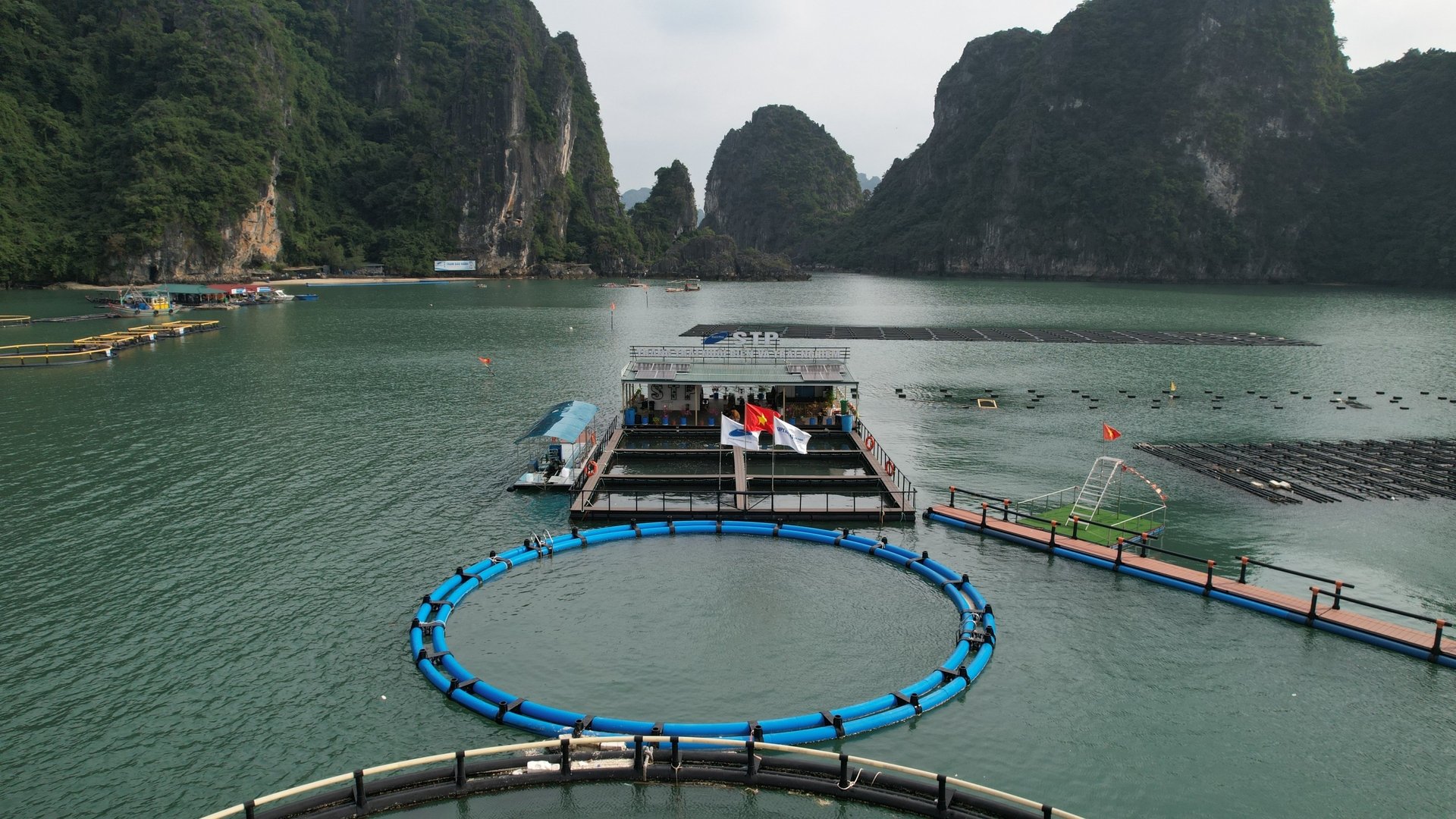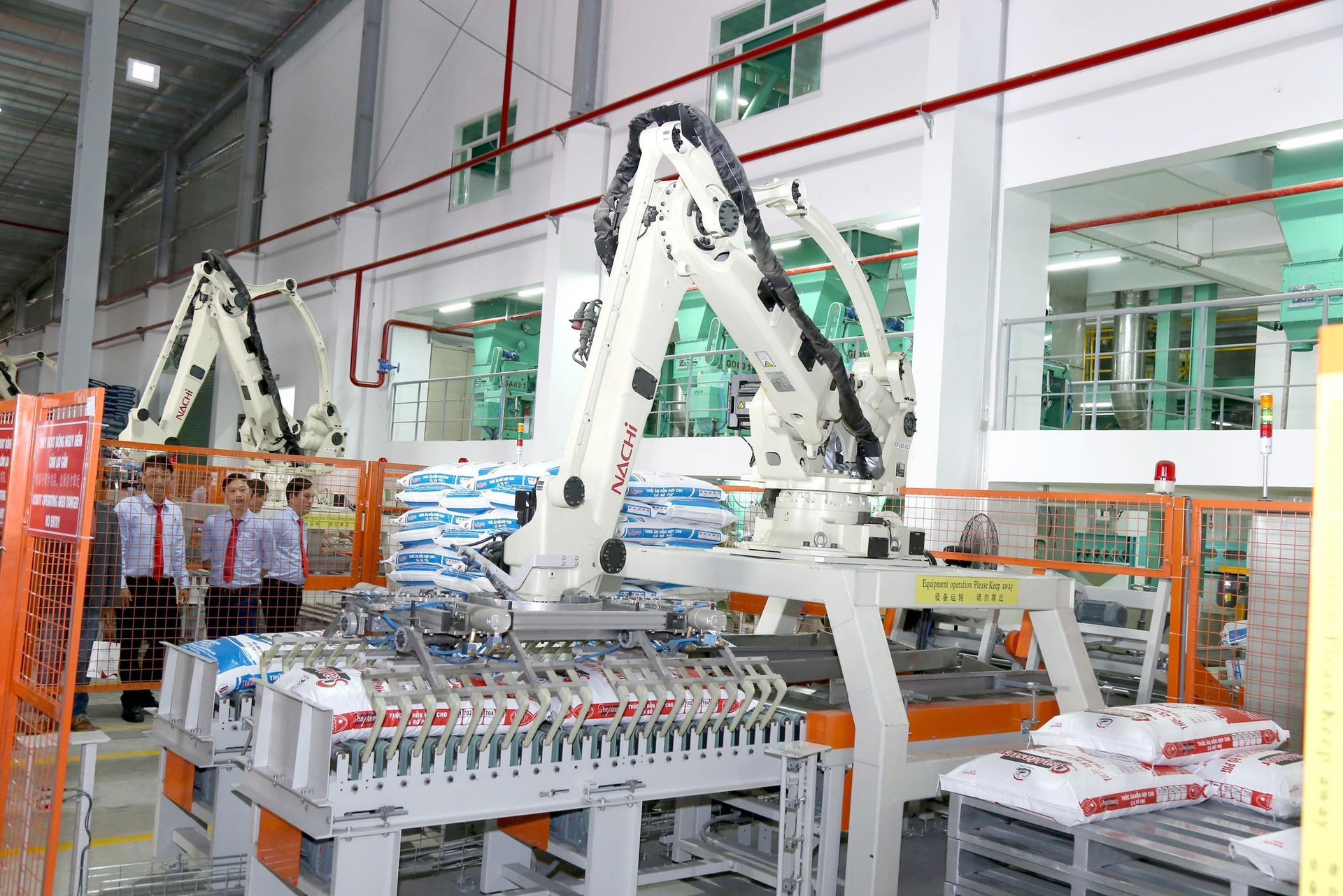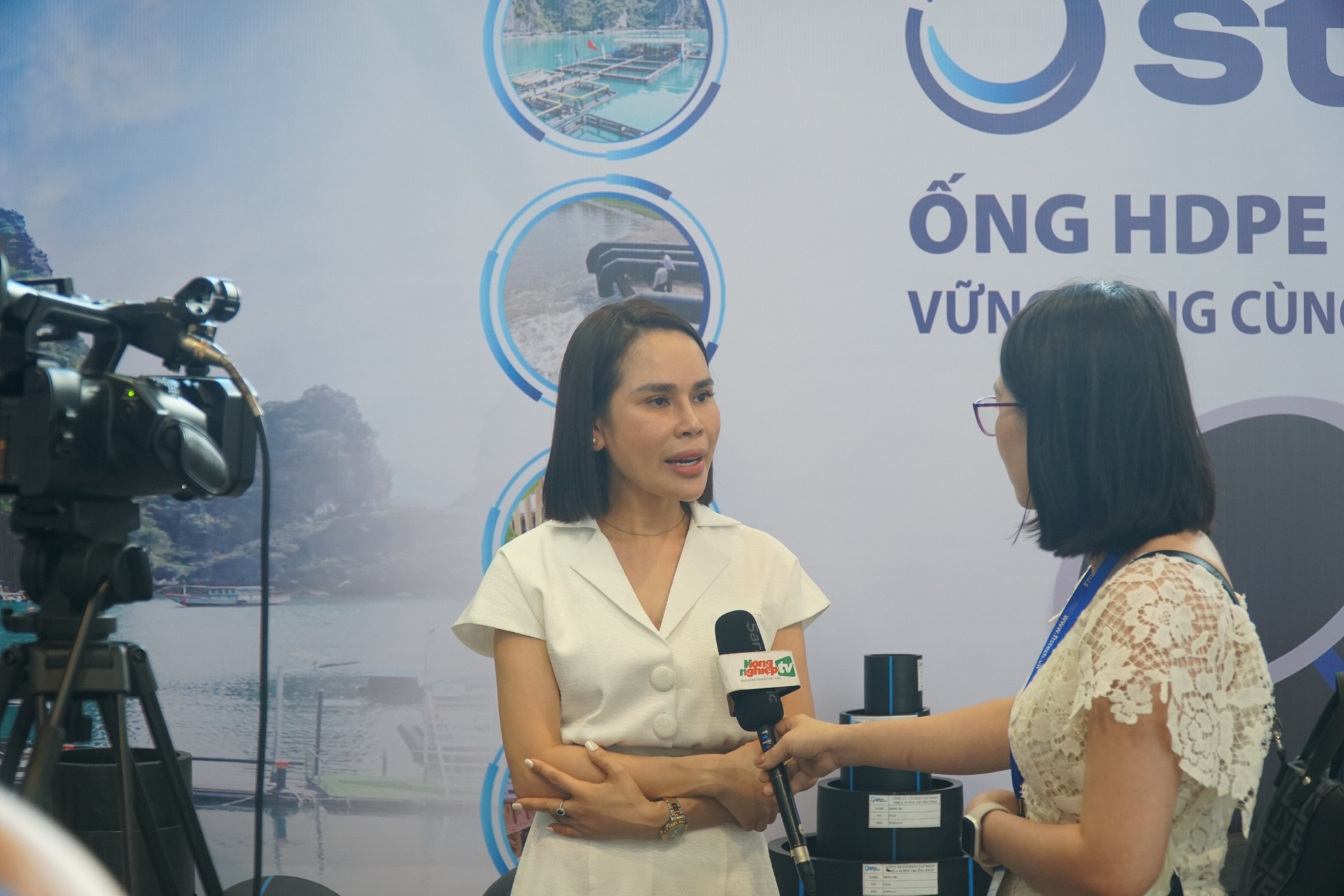May 29, 2025 | 10:46 GMT +7
May 29, 2025 | 10:46 GMT +7
Hotline: 0913.378.918
May 29, 2025 | 10:46 GMT +7
Hotline: 0913.378.918

The marine farm combines STP Group's experience on Phat Co Island, Van Don, and Quang Ninh. Photo: STP Group.
According to a report by the Department of Fisheries (Ministry of Agriculture and Rural Development), Total seafood output in the first 8 months of 2023 is estimated to reach more than 5.93 million tons, up 1.9% over the same period last year. Of which, exploitation output is estimated at more than 2.63 million tons, up 0.3% over the same period (see exploitation reached more than 2.5 million tons, inland exploitation 123.5 thousand tons).
Aquaculture output is estimated at nearly 3.3 million tons, up 3.2% over the same period; of which, pangasius reached 1079.1 thousand tons, an increase of 2.3%; shrimp reached 718.4 thousand tons, an increase of 4.1% (black tiger shrimp reached 176.2 thousand tons, an increase of 1.3%; white leg shrimp reached 498.1 thousand tons, an increase of 5.1%). In 2023, the fisheries industry targets a total output of 9.05 million tons, of which aquaculture alone will reach 5.37 million tons.
Vietnam's fisheries development strategy for 2030, vision to 2045 also sets the goal that, by 2023, aquaculture output will reach 7 million tons. Accordingly, the strategy also clearly states the view that we must focus on investing in developing synchronous technical infrastructure; strengthen research, transfer and application of technology, prioritize the application of high technology, digital transformation...
Mr. Ngo Tat Thang, Deputy Director of Quang Ninh Department of Agriculture and Rural Development said: Currently, coastal provinces, not only in Vietnam but in all countries, must share resources, which are ground space and water surface. This sharing of resources helps develop urban, service, and industrial, but it also affects the seafood industry because it is the most important production space of the industry. Reorganizing for reasonable production requires planning and application of science and technology.
According to Mr. Thang: "Currently we have many levels of production, from large enterprises to cooperative associations, large farms and smallholder farmers. However, household production is still the mainstay, so the application of technology must also be step by step, it is not necessary that all household technologies must be applied.
“The management system will be selected by the State management agency based on evaluating the technical standards of the industry and make recommendations based on the directional planning of each farming area and each farming species. Currently, in the issue of applying science and technology, we also pay a lot of attention to the issue of policies and mechanisms so that we can best apply it", Mr Thang added.
Mr. Nguyen Khac Hai, Technical Director of Thang Long Biological Engineering Co., Ltd. - a 100% foreign-invested enterprise, specializes in producing and trading aquatic feed, aquatic breeds, biological products in aquaculture and solutions in aquaculture through the company's models, said: "Currently, most industries in general and the fisheries sector in particular are in the same trend of applying science and technology to improve product quality".

Aquatic food production is one of the key areas of Thang Long Company, so applying technology in this field is inevitable. Photo: Hong Tham.
Mr Hai said: "Aquaculture feed production is one of the key areas of Thang Long Company. Therefore, the application of technology in this field is inevitable. We have invested in the most advanced machinery systems in the production process to diversify products, not only produce mixed feed products but also produce functional foods, such as: Foods that support digestion and foods that support shrimp liver protection aim to improve the health and survival rate of animals, thereby improving efficiency for farmers".
“In the field of shrimp seed production, Thang Long is currently building the 'Adaptive Seed' model to meet a variety of farming models, especially shrimp farming models applying high technology. This model requires the seed to have a good growth rate, so we must determine the source of broodstock as well as the technology. So that we are able to produce breeds with good resistance, fast growth rate, and reach a large size to increase the output value for customers", Mr Hai added.
Ms Nguyen Thi Hai Binh, General Director of Super Truong Phat Plastic Group Joint Stock Company (STP Group) shared: “Vietnam is a country with three-quarters of the sea, with large resources and sea area. Thus, we have great potential to exploit and deploy aquaculture in general and marine farming in particular".

Ms. Nguyen Thi Hai Binh, General Director of Super Truong Phat Plastic Group Joint Stock Company (STP Group): Up to now, aquaculture has developed to a new step, which is the application of science and technology. Photo: Nguyen Thanh.
“Currently STP Group has 3 main solutions for the aquaculture industry. Firstly, the cage is suitable for offshore farming, can withstand level 12 wind storms, and coordinates can be located on it. In special cases, it is still possible to find output and data at sea using the QR code and icheck on the cage. The second is a replacement product for the foam floats that people used to use, or replacing drums with floating systems made of houses, with HDPE buoys that are sustainable for the sea and protect the environment. Third, all products are associated with the environment, protecting the environment, and lasting up to 50 years. It can be integrated with science and technology, such as cage-sinking technology, and automatic feeding... People can leave the cages there and raise fish completely automatically, without having to go ashore or offshore to take care of them", Ms Binh said.
“Up to now, aquaculture has developed to a new step, which is applying science and technology to farming, not offshore exploitation like in the past. This is in line with world trends", said Ms Nguyen Thi Hai Binh, General Director of Super Truong Phat Plastic Group Joint Stock Company (STP Group).
Translated by Hoang Duy
/2025/05/25/4127-3-073637_820.jpg)
(VAN) Thanks to the promotion from an FAO-implemented project, vegetable production in greenhouses in Moc Chau has seen strong development, from 1.5 hectares in 2021 to nearly 50 hectares in 2024.

(VAN) FAO has recently supported USD 140,000 to implement the project 'Risk mitigation human-animal interface risks through disease control initiatives in pig farming.'

(VAN) The People's Committee of Tra Vinh province has approved an adjustment to the investment policy for the Green Hydrogen Plant project, increasing its area to approximately 52.76 hectares.
![Reducing emissions from rice fields: [2] Farmers’ commitment to the soil](https://t.ex-cdn.com/nongnghiepmoitruong.vn/608w/files/news/2025/05/05/dsc08881jpg-nongnghiep-140632.jpg)
(VAN) Clean rice cultivation model in Thuong Tan commune, Bac Tan Uyen district, is assisting local residents in achieving sustainable agriculture by substantially reducing costs, increasing productivity, and protecting the environment.

(VAN) At the conference to disseminate Resolution No. 68, AgriS introduced its digital agricultural ecosystem and reaffirmed its commitment to accompanying the Government in promoting private sector development and sustainable agriculture.

(VAN) 'Blue Ocean - Blue Foods' initiative is designed to restore marine ecosystems and establish sustainable livelihoods for local communities by cultivating a minimum of 1,000 hectares of cottonii seaweed in the first three years.
/2025/05/21/4642-3-112707_603.jpg)
(VAN) The V-SCOPE project has made direct contributions to three out of six pillars of the Comprehensive Strategic Partnership between Vietnam and Australia.